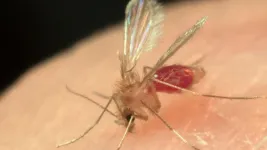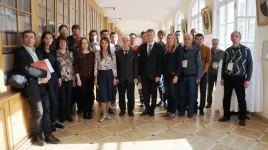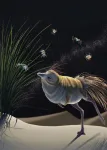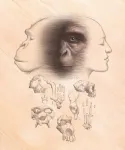(Press-News.org) Loneliness and social isolation have been significant problems for the general population during the COVID-19 pandemic, but for cancer patients these issues were particularly acute, likely due to isolation and social distancing, according to a new UCSF study.
The study, which is the first to evaluate loneliness, anxiety, depression, fatigue and other symptoms in a single group of patients, is published in Cancer, a peer-reviewed journal of the American Cancer Society.
"We found that oncology patients were experiencing a deep sense of loneliness," said first author Christine Miaskowski, RN, PhD, a professor in the UCSF School of Nursing.
"For these patients, the burden of their symptoms is extremely high, and oncology clinicians can suggest a number of strategies to help them," she said. "Patients should be encouraged to maintain contact with family and friends, and structure their daily routines when possible, through outdoor activities for example, as well as to maintain a healthy diet and sufficient sleep. These suggestions might mitigate some of the negative effects of loneliness."
The COVID-19 pandemic brought to the forefront a pervasive sense of loneliness in the lay population, but the effects have not been well-studied in oncology patients. The new survey, administered in late May 2020, evaluated the severity of loneliness, social isolation and related symptoms - such as anxiety, depression, fatigue, sleep disturbance, cognitive dysfunction and pain - in a sample of 606 oncology patients.
Altogether, 53 percent were found to be in the lonely group, which was higher than the range reported prior to the pandemic (32 percent - 47 percent). About a third had moderately high degrees of loneliness, and 5.3 percent reported high levels of depression.
The lonely group was significantly more likely to be younger than the non-lonely group and less likely to be married or partnered. They also had a higher number of comorbidities and were more likely to report a diagnosis of depression and back pain.
Older cancer patients reported lower levels of loneliness, while patients 50 to 59 reported higher levels. The researchers believe older adults adapted their need for social contact to available opportunities.
Lower levels of household income were associated with higher levels of loneliness. The authors suggest that people at higher incomes have "more opportunities to engage in social activities and reciprocate in social relationships."
Nearly 83 percent of the patients in the lonely group suffered from breast cancer, a third were currently in cancer treatment and a quarter had metastatic disease. Nearly 92 percent of the participants were female - as a result, no conclusions could be drawn about sex differences, the authors said.
Primarily, the participants were White, well-educated, and had an annual income exceeding $60,000. As such, the authors said, their findings may not fit all patients with cancer, and symptoms could be higher in patients who are socioeconomically disadvantaged.
INFORMATION:
Additional UCSF authors include Steven M. Paul, PhD; Karen Snowberg, MA; Hala Borno, MD; Susan M. Chang, MD; Lee May Chen, MD; Bruce A. Cooper, PhD; Stacey A. Kenfield, ScD; Kord M. Kober, PhD; Angela Laffan, MS, NP; Jon D. Levine, MD, PhD; Kim Rhoads, MD, MPH; Katy K. Tsai, MD; Erin L. Van Blarigan, ScD; and Katherine Van Loon, MD, MPH.
Miaskowski is an American Cancer Society Clinical Research Professor. Van Blarigan is funded by the National Institutes of Health (CA197077). Additional funding sources can be found in the paper.
About UCSF: The University of California, San Francisco (UCSF) is exclusively focused on the health sciences and is dedicated to promoting health worldwide through advanced biomedical research, graduate-level education in the life sciences and health professions, and excellence in patient care. UCSF Health, which serves as UCSF's primary academic medical center, includes top-ranked specialty hospitals and other clinical programs, and has affiliations throughout the Bay Area. UCSF School of Medicine also has a regional campus in Fresno. Learn more at ucsf.edu, or see our Fact Sheet.
Follow UCSF
ucsf.edu | Facebook.com/ucsf | YouTube.com/ucsf
Researchers at North Carolina State University and the University of North Carolina Greensboro made a surprising finding while examining areas where sand flies rear their young: a new species of bacteria that is highly attractive to pregnant, or gravid, sand flies. The findings could advance the production of ecologically safe baits or traps to reduce sand fly populations.
Sand flies are vectors for important parasitic diseases affecting people in tropical and subtropical regions in Asia, Africa and the Middle East. One of those diseases is Leishmaniasis, which generally causes ...
HOUSTON - (May 6, 2021) - A Rice University laboratory has adapted its laser-induced graphene technique to make high-resolution, micron-scale patterns of the conductive material for consumer electronics and other applications.
Laser-induced graphene (LIG), introduced in 2014 by Rice chemist James Tour, involves burning away everything that isn't carbon from polymers or other materials, leaving the carbon atoms to reconfigure themselves into films of characteristic hexagonal graphene.
The process employs a commercial laser that "writes" graphene patterns into surfaces that to date have included wood, paper and even food.
The new iteration writes fine patterns of graphene into photoresist polymers, light-sensitive materials used in photolithography and ...
As the human body's largest organ, the skin is responsible for protecting against a wide range of possible infections on all fleshy surfaces, from head to toe. So how exactly does the skin organize its defenses against such an array of threats?
A new Yale study shows that the epidermis, the outermost layer of skin, is comprised of an army of immune cells that station themselves at regular intervals across the skin's vast expanse to resist infection. When necessary, the researchers found, these immune system soldiers are able to reposition themselves to protect vulnerable areas.
The study, published in the journal Nature Cell Biology, was conducted by the lab of Valentina ...
The introduction of lithium-ion (Li-ion) batteries has revolutionized technology as a whole, leading to major advances in consumer goods across nearly all sectors. Battery-powered devices have become ubiquitous across the world. While the availability of technology is generally a good thing, the rapid growth has led directly to several key ethical and environmental issues surrounding the use of Li-ion batteries.
Current Li-ion batteries utilize significant amounts of cobalt, which in several well-documented international cases is mined using child labor in dangerous working ...
The idea of creating quantum computers has long captured the minds of researchers and experts of IT corporations. They are the most powerful computers operating according to the laws of the quantum world and capable of solving many problems more efficiently than the most productive classical supercomputers. Similar developments are underway, for example, at Google and IBM. However, many such projects require the use of cryostats. These are vessels with liquid nitrogen or compressed helium, inside which quantum processors are cooled to temperatures below -270°C. Such a low temperature is required to maintain the superconductivity effect, which is necessary for the operation ...
Today's 10,000 species of birds live in virtually every habitat on Earth, but only a handful have adaptations enabling them to hunt active prey in the dark of night. Scientists have long wondered whether theropod dinosaurs - the group that gave rise to modern birds - had similar sensory adaptations.
A new study led by University of the Witwatersrand scientist, Professor Jonah Choiniere, sought to investigate how vision and hearing abilities of dinosaurs and birds compared. The international team of researchers used CT scanning and detailed measurements to collect information ...
New Haven, Conn. -- If paleontologists had a wish list, it would almost certainly include insights into two particular phenomena: how dinosaurs interacted with each other and how they began to fly.
The problem is, using fossils to deduce such behavior is a tricky business. But a new, Yale-led study offers a promising entry point -- the inner ear of an ancient reptile.
According to the study, the shape of the inner ear offers reliable signs as to whether an animal soared gracefully through the air, flew only fitfully, walked on the ground, or sometimes went swimming. In some cases, the inner ear even indicates whether ...
The findings, published in the journal Science today, demonstrate how integrating vertical descent and horizontal gene transfer can be used to infer the root of the bacterial tree and the nature of the last bacterial common ancestor.
Bacteria comprise a very diverse domain of single-celled organisms that can be found almost everywhere on Earth. All Bacteria are related and derive from a common ancestral Bacterial cell. Until now, the shape of the bacterial tree of life and the placement of its root has been contested, but is necessary to shed light on the early evolution of life on our ...
The uncertainty principle, first introduced by Werner Heisenberg in the late 1920's, is a fundamental concept of quantum mechanics. In the quantum world, particles like the electrons that power all electrical product can also behave like waves. As a result, particles cannot have a well-defined position and momentum simultaneously. For instance, measuring the momentum of a particle leads to a disturbance of position, and therefore the position cannot be precisely defined.
In recent research, published in Science, a team led by Prof. Mika Sillanpää at Aalto University in Finland has shown that there is a way to get around ...
In the 150 years since Charles Darwin speculated that humans originated in Africa, the number of species in the human family tree has exploded, but so has the level of dispute concerning early human evolution. Fossil apes are often at the center of the debate, with some scientists dismissing their importance to the origins of the human lineage (the "hominins"), and others conferring them starring evolutionary roles. A new review out on May 7 in the journal Science looks at the major discoveries in hominin origins since Darwin's works and argues that fossil apes can inform us about essential aspects of ape and human evolution, including the nature ...







